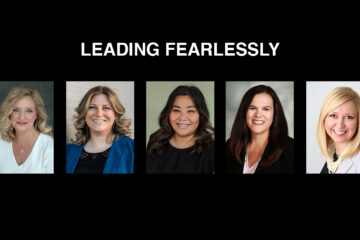Leading Fearlessly: What are the most critical skills for up-and-coming leaders?


Did you know that companies that develop a strong bench of leaders are six times more likely to engage and retain top talent than organizations that do not?
That finding was reported in a new 2023 Global Leadership Forecast conducted by consulting firm DDI, which showed developing high-potential leaders is a critical step in retaining them and preparing them to advance – which all contribute to overall company performance.
Many organizations report major challenges with finding talent overall, and identifying and retaining leaders is equally difficult. A recent Forbes article says, “The primary culprit behind leadership shortages is that the intense labor market is hindering companies from retaining or developing enough capable younger leaders.” Once you do find emerging leaders, the DDI research indicates it is important to let these team members know you value them, provide training and development and show them a potential career path.
But what skills are the most important to develop? The DDI survey asserts that the five most critical skills for emerging leaders to master are: Identifying and developing future talent, strategic thinking, managing successful change, decision-making and prioritization and influencing others. Skills assessments, coaching from internal or external coaches and training from qualified instructors are all cited as being important to leaders on the rise.
While these represented the point of view from an employer perspective, I turned to several local up-and-coming leaders for their thoughts. I asked these leaders to share one leadership skill they feel is critical for up-and-coming leaders to develop in order to be successful, and for a time when they realized how important this skill was for leadership advancement. While their insights aligned with DDI’s research, many commented on skills involving emotional intelligence. Here is what they had to say.

Lacy Covarrubias, senior vice president, treasury management, Community State Bank:
One critical leadership skill: Give grace. Learn how to offer grace and avoid creating narratives around truths. It is essential to know when to step back and reflect rather than make assumptions with your staff and team members. This will allow you to gain people’s trust and respect while modeling that you understand there is more to everyone’s day than what happens at work. This also encourages less drama in the workplace because team members take into consideration what they could’ve done differently rather than placing blame during conflicts.
Her experience and advice: I’ve had several instances when I’ve seen this skill come into play. I was once an impatient leader. I was stubborn, neglected to find positive intent, and made assumptions that certain people “didn’t want to work that hard” or “didn’t care.” Through valuable mentorship, I began reflecting on the possibility that I may have not done my part in being a clear communicator, outlining fair expectations, actively listening or taking enough interest in their lives outside of the office. There’s nothing more important than checking in with your team. When I start to see lapses in performance, I’ve learned to stop thinking that it’s intentional. Instead, I sit down with my staff and learn what their ideal vision is. I find that perhaps there are outside influences making an impact, or maybe we don’t have them on the right career path. You can retain a lot of good people on your team, and within your organization, by truly investing in them and practicing effective communication.
My team has experienced the loss of grandparents, parents, spouses and children. To watch how grace and compassion work through us and how we wrap our arms around each other in these moments, expecting nothing in return, is incredible. Continuing to coach this skill, outside of tragedy, is also crucial to our success as a high-performing team.
Developing this skill of practicing grace requires focus on emotional intelligence. It’s a skill that will accompany you throughout your career and advancement. Whether you are new to your career, managing a team, networking or presenting to a board of directors, this approach is projected and seen by those around you.

Janae Gray, vice president of marketing and supplier diversity, Mittera:
One critical leadership skill: Get comfortable with ambiguity. As our world continues to move rapidly, we are experiencing multifaceted challenges. It’s crucial to get comfortable with ambiguity to truly foster adaptive thinking skills as a path forward in successful leadership. By identifying and responding to change indicators, we can quickly analyze and provide valuable out-of-the-box solutions, allowing us to thrive through challenges and create opportunities for tomorrow. Acknowledging our own limitations and allowing room for vulnerability allows us to connect with diverse perspectives of others, which drives collective innovation and progress. By owning our adaptive skills, we can create cultural shifts that will fundamentally embrace learning, complexity and resilience.
Her experience and advice: Nothing is a death sentence if you can be adaptive. As a marketing professional, there is always something new lurking around the corner. I learned early on in my career that disruptions are inevitable, especially in the marketing space. Acknowledging that one can’t be the expert at everything was essential in my ability to adapt and cross-pollinate enterprise-wide changes and solutions. For me, disruptions have become opportunities to do things differently than how you do them today or how it performed last time. To remain resilient and ahead of those disruptions, we must get uncomfortable.
Getting uncomfortable is a good thing. Doing things that are unfamiliar lays the groundwork for transformation by prioritizing growth. While trying new ideas and solutions may not always bring success, you will always learn something new as opposed to if you’d taken the known route. Embracing that vulnerability is what truly opens the door to adaptive thinking. To me, it is also a key trait that fosters team growth and allows individuals to be curious and to challenge the conventional way. With disruption always in sight, adaptive thinking and leadership allows you to remain flexible and resilient to whatever is around the corner.

Laura Lopez, PCC Retirement Income Solutions, Principal Financial Group and Spanish digital skills instructor, Evelyn K. Davis Center:
One critical leadership skill: Show initiative. One leadership skill I feel is critical for up-and-coming leaders to develop in order to be successful is initiative. Having initiative will help create opportunities. Sometimes one is waiting for the right time to start something, but the right time is now. Either we win or we learn. We have to learn to always be ready for when opportunities come but we also have to be willing to seek opportunities. This is something I struggled with but after taking initiative, I have realized that it has a big impact in our personal and professional development.
Her experience and advice: An example of a time where I showed initiative was when I ran for vice president of events for the Student Activities Council at DMACC Urban campus in 2015-16. I did not have experience serving on a board, so I didn’t know if I was ready, but I still went for it. I had to get out of my comfort zone, but it was worth it because I grew and gained many other skills. I also had the support of the former board members and other leaders who always believed in me and pushed me. Mentorship helped me take initiative in many things. I knew I had others around me who were supporting me and I wanted to make them proud because I was grateful that they believed in me. Three of the ladies who empowered me during those years were Norma Perez, Marcela Hermosillo-Tarin and Laura Douglas. Later, I started to be involved in student organizations. This opened many doors for me, built my leadership skills and confidence, and helped me overcome obstacles I faced as a first-generation, Latina college student.
I am currently at Principal Financial Group, where I am on the steering committee for its Hispanic Latino Employee Resource Group. A piece of advice I would give is to look for mentors or people who will uplift you, challenge you, inspire you and push you to get out of your comfort zone. I have had the privilege to meet many amazing people who are willing to mentor me, including Wanda Mejia, Eric Idehen, Semsa Dedic, Miriam Lewis and others. Another piece of advice I would give is to do something that scares you or that you have been thinking about doing but don’t feel ready. Nothing is impossible. Another thing I’d like to share was that as of this month, I am officially a first-time homeowner. The thought of buying a home was scary, and I thought I wasn’t ready but I went for it and have officially bought my first home. I will also be starting my MBA at Iowa State University next month.

Kathleen McGuire, director, finance and capital markets, Invenergy
One critical leadership skill: Communication. We have all heard it before: Communication is key to leadership success. As someone just starting out, asking questions and building relationships creates an opportunity to learn and an incredible foundation to build upon. Then, being able to provide succinct responses and effective presentations allows others to clearly understand the direction they are headed. Also, we can’t forget that listening is a significant part of communication so it is important to really leverage that to understand those around you.
Her experience and advice: As an introvert, I realized early on in my professional career that if I was going to achieve the goals and dreams that I had for myself, I had to increase my communication level and skills. I had to get outside of my comfort zone and start communicating and that meant more than just sending emails. This can be a daunting task for introverts because my energy would be drained just by thinking about a conversation I needed to have or a question I needed to ask. What I realized is that I needed to practice, to flex that muscle. Something that was particularly challenging for me was speaking up or asking questions in meetings, especially if there were leadership team members present. A mentor that I had knew this about me, but also recognized if I could overcome this, then everyone would see my potential. To overcome my nerves, we would prepare for the meetings together and make sure I was actually over-prepared. This gave me the confidence to speak up and ask questions. Over time, this became part of my meeting preparation process, and I became much more confident in my abilities. I also showed people around me that I had good ideas, intuition and an understanding of what was going on. Now, it’s just a natural part of my day to day.



1 Comment
Rgrileyjr · August 14, 2023 at 11:06 pm
Excellent article showing the multiple skill sets needed to provide confidence, which will allow fearless behavior. Polarity thinking (both/and) is one of these tools that is often overlooked. The ability to see the positives and negatives of two seemingly opposing points of view allows leaders to have the confidence to be brave. Great subject matter and a great article.
Comments are closed.